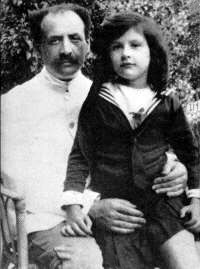Simone Weil
Simone Weil (3 February 1909 – 24 August 1943) was a French philosopher, mystic, and political activist. Weil's work spanned numerous disciplines, including philosophy, religion, politics, and history. She is known for her writings on spirituality and social justice, as well as her involvement in the French Resistance during World War II.
Early Life and Education[edit | edit source]
Simone Weil was born in Paris to a secular Jewish family. Her brother, André Weil, would go on to become a famous mathematician. From an early age, Simone displayed an exceptional intellect and a profound empathy for the working class. She pursued her education at the prestigious École Normale Supérieure, where she studied philosophy, graduating at the top of her class.
Career and Activism[edit | edit source]
After completing her education, Weil taught philosophy at several secondary schools. However, her career in academia was marked by her continuous involvement in political activism. She was deeply concerned with the plight of the working class and often took leaves of absence from her teaching positions to work in factories and on farms to better understand the conditions of laborers.
In the 1930s, Weil became involved with the trade union movement and participated in the Spanish Civil War on the side of the Republican forces, though her poor health and accidents limited her contributions. Her experiences during this period deepened her critique of both capitalism and communism, leading her to advocate for a form of social organization that respected both individual liberty and collective responsibility.
Philosophy and Writings[edit | edit source]
Weil's philosophy is characterized by her deep religious sentiment and her commitment to social justice. She was influenced by a wide range of thinkers, from Plato and Saint Augustine to Mahatma Gandhi. Weil's thought cannot be easily categorized, as it encompasses elements of Marxism, Christianity (particularly Catholic mysticism, though she never formally converted), and ancient Greek philosophy.
Her most notable works include The Need for Roots, in which she argues for the importance of spiritual and cultural roots for the health of individuals and societies, and Gravity and Grace, a collection of reflections on the nature of divine love and human suffering. Weil's writings on attention and the role of the material world in spiritual life have been particularly influential in both philosophical and religious studies.
Death and Legacy[edit | edit source]
Simone Weil died in 1943 at the age of 34, from tuberculosis exacerbated by malnutrition. Her health had declined due to her refusal to eat more than what she believed was available to the soldiers fighting in World War II. Despite her relatively short life, Weil's work has had a lasting impact on a wide range of fields, including theology, philosophy, and political theory.
Her ideas on the importance of attention, compassion, and the need for a connection to something greater than oneself continue to inspire scholars and activists. Weil's commitment to understanding and alleviating human suffering, her critique of materialism, and her exploration of the spiritual dimensions of life remain deeply relevant.
See Also[edit | edit source]
Navigation: Wellness - Encyclopedia - Health topics - Disease Index - Drugs - World Directory - Gray's Anatomy - Keto diet - Recipes
Search WikiMD
Ad.Tired of being Overweight? Try W8MD's physician weight loss program.
Semaglutide (Ozempic / Wegovy and Tirzepatide (Mounjaro) available.
Advertise on WikiMD
WikiMD is not a substitute for professional medical advice. See full disclaimer.
Credits:Most images are courtesy of Wikimedia commons, and templates Wikipedia, licensed under CC BY SA or similar.
Contributors: Prab R. Tumpati, MD






